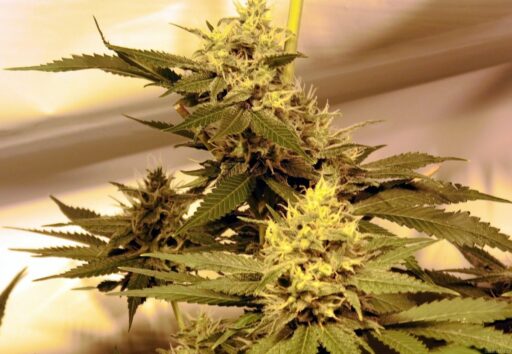The discussion surrounding marijuana legalization in the United States has taken a dramatic turn with former President Donald Trump’s push to legalize the substance. This move has the potential to alter the political landscape, influence public opinion, and reshape the legal and economic frameworks associated with cannabis. As the country navigates through a complex maze of policies, public sentiment, and legislative hurdles, the implications of such a game-changing initiative are profound. This article delves into the key aspects of this debate, considering the potential impact on the upcoming elections, the current administration’s stance, and the broader societal repercussions.
Key Takeaways
- Trump’s advocacy for marijuana legalization could significantly influence policy and sway voters in key swing states, potentially affecting the outcome of future elections.
- Public opinion strongly supports marijuana legalization, with recent polls indicating a supermajority in favor, suggesting it could be a decisive issue in the 2024 elections.
- Biden’s campaign promises on marijuana reform have led to some federal actions, but advocates argue these measures fall short of expectations and comprehensive reform.
- The DEA has not provided an update on rescheduling marijuana, indicating ongoing regulatory hurdles that continue to impede full legalization efforts.
- Legalization could have major economic and social implications, including advancing racial justice and challenging the illicit market through the growth of legal cannabis businesses.
The Political Landscape of Marijuana Legalization
Biden’s Promises vs. Actions: A Closer Look
Throughout his campaign, President Biden vocalized strong support for decriminalizing marijuana, a stance that resonated with many advocates for reform. However, the progress on this front has been met with mixed reviews. Biden’s actions do not fully decriminalize marijuana, but steps have been taken that suggest a gradual approach to fulfilling this promise.
While comprehensive decriminalization has not been achieved, the administration has made some strides. Here’s a brief overview of the actions taken:
- Issued pardons for individuals with prior federal offenses of simple marijuana possession
- Encouraged governors to follow suit at the state level
- Supported research into the impacts of marijuana use
Despite these actions, critics argue that the pace of change has been slow and that the administration could do more to advance the cause of decriminalization. The PolitiFact Biden Promise Tracker notes that while decriminalization advocates view recent steps as progress, they are still waiting for more substantial changes.
The administration’s approach appears to be one of cautious progression, rather than sweeping reform. This incremental strategy may be a tactical choice, aiming to balance public opinion and political feasibility.
Trump’s Potential Influence on Marijuana Policy
As the 2024 presidential election approaches, the potential influence of Donald Trump on marijuana policy becomes a focal point of discussion. Trump’s stance on legalization could sway key swing state voters, where the issue of marijuana reform has gained traction. The former president’s position may contrast with Biden’s promises versus actions, which have been a source of contention among cannabis advocates.
- Biden’s campaign promises included decriminalizing cannabis and expunging prior convictions.
- Trump’s influence could be pivotal in states where marijuana reform is a significant issue.
- Cannabis advocates view Biden’s current efforts as insufficient, highlighting the need for more decisive federal action.
The political tug-of-war over marijuana policy is intensifying as the election looms, with both candidates potentially leveraging the issue to gain an edge in crucial states.
While the Biden administration has initiated steps towards reform, such as federal pardons for simple possession, the lack of comprehensive federal legalization leaves room for Trump to propose a game-changing stance. The outcome of this policy battle could be a determining factor in the upcoming election, especially in states where the marijuana debate has already ‘broken through‘.
The Role of Marijuana Legalization in Swing States
The political significance of marijuana legalization is becoming increasingly apparent in swing states. Public opinion has shown a strong favor towards legalization, with recent polls indicating that a majority of Americans support the rescheduling of marijuana. This sentiment is echoed in states like Arizona, Michigan, Nevada, and Wisconsin, where the issue could influence voter turnout and preferences.
The potential for marijuana reform to sway elections is not lost on political strategists. It’s seen as a modern issue that could define a candidate as forward-thinking and responsive to public demands.
In the context of the upcoming elections, the impact of marijuana policy could be particularly pronounced. With Biden and Trump polling closely, the support for marijuana reform might tip the scales in crucial battleground states. The promise of decriminalization and expungement of prior convictions has already been a talking point in previous campaigns, underscoring its potential electoral leverage.
Public Opinion and Marijuana Reform

National Surveys Indicate Strong Support for Legalization
Recent national surveys have consistently shown a strong support for the legalization of marijuana. A Gallup poll highlighted that a record 70 percent of Americans support legalizing marijuana. This sentiment is echoed by other polls, such as one from Lake Research Partners, which found that 58 percent of respondents support rescheduling marijuana to Schedule III.
The Tarrance Group survey further reinforces this trend, with 57 percent of likely voters favoring nationwide cannabis legalization. This includes a significant 35 percent who expressed strong support for the policy change.
The convergence of public opinion on this issue suggests a shifting tide in the national consciousness, one that transcends traditional party lines and signals a readiness for reform.
The broad support for legalization spans across various demographics and political affiliations, indicating that marijuana reform could be a unifying issue in upcoming elections. Advocates believe that embracing this popular stance could be a strategic move for any candidate willing to listen to the electorate.
The Impact of Public Opinion on Federal Policy Changes
The undeniable wave of public support for marijuana legalization has reached a crescendo, with recent polls reflecting a substantial majority in favor. This groundswell of public opinion is increasingly difficult for policymakers to ignore, and it is shaping the conversation around federal policy changes.
Public sentiment is not just a barometer of societal attitudes but a potential catalyst for legislative action. The following table highlights key findings from recent surveys:
| Survey Organization | Support for Legalization | Support for Rescheduling |
|---|---|---|
| Gallup | 70% | N/A |
| Lake Research Partners | 58% | 58% |
The alignment of public opinion with potential political gains suggests that marijuana reform could be a strategic move for candidates seeking to connect with voters across the political spectrum.
The notion that the will of the people should guide legislative changes is not new, but it is particularly potent in the context of marijuana reform. As the public’s voice grows louder, the pressure mounts on federal officials to consider rescheduling marijuana and addressing the legal and social issues surrounding its use.
Advocates’ Views on Biden’s Approach to Marijuana Reform
Cannabis advocates have expressed disappointment with President Biden’s approach to marijuana reform, pointing out that his administration’s steps, while progressive, do not fully align with the expectations set during his campaign. Biden’s reluctance to fully legalize marijuana at the federal level is seen as a missed opportunity to engage young voters. Advocates argue that reclassifying marijuana to Schedule III from Schedule I, as proposed, is insufficient to address the conflicts between state and federal laws.
The Biden administration’s actions, including federal pardons for simple possession and initiating the rescheduling process, have been met with criticism for not going far enough. The lack of a decision from the DEA on rescheduling and the limited scope of federal pardons, which do not extend to state-level convictions, have left many advocates wanting more comprehensive reform.
Advocates are calling for a coupling of marijuana legalization with broader criminal justice reform. They believe that a comprehensive approach would send a strong message to young voters and underscore Biden’s image as a "modern president." This could have significant implications in swing states such as Arizona, Michigan, Nevada, and Wisconsin.
The Legal and Regulatory Hurdles

The Current Status of Marijuana Under the Controlled Substances Act
Under the Controlled Substances Act (CSA), marijuana is classified as a Schedule I controlled substance, a category reserved for drugs with a high potential for abuse and no accepted medical use. This classification has been a point of contention, as it places marijuana in the same category as heroin and LSD, despite the growing body of research suggesting potential medical benefits and lower risk of dependency compared to other Schedule I substances.
The classification of marijuana under the CSA has significant legal and social implications, affecting everything from criminal justice to scientific research.
The debate over marijuana’s scheduling status is ongoing, with advocates pushing for rescheduling or descheduling to reflect the changing public opinion and state-level legalization efforts. However, the DEA has not provided any recent updates on the potential rescheduling of marijuana, maintaining the status quo for the time being.
The current legal landscape is a patchwork of state laws that often conflict with federal regulations, creating a complex environment for users, businesses, and law enforcement agencies.
Federal Pardons for Simple Possession: Significance and Limitations
The Biden administration’s decision to issue federal pardons for simple marijuana possession marks a significant shift in the federal approach to cannabis policy. This move signals a step towards broader reform, but it also highlights the limitations of executive action in the absence of comprehensive legislative change.
- The pardons apply only to federal offenses, leaving individuals with state-level convictions without relief.
- Advocates argue that the pardons do not go far enough to address the historical overcriminalization in minority communities.
- The action is seen as a partial fulfillment of campaign promises, with calls for more decisive steps such as complete descheduling.
The pardons represent a complex interplay between criminal justice reform and federal drug policy, offering a glimpse of potential progress while underscoring the need for a more holistic approach.
While the pardons have been welcomed by many, they also serve as a reminder of the intricate legal and regulatory framework governing marijuana, which includes the DEA’s ongoing review of its scheduling status. The administration’s encouragement for states to follow suit with their own pardons has yet to result in widespread action, leaving a patchwork of policies across the nation.
The DEA’s Stance on Marijuana Rescheduling
The Drug Enforcement Administration (DEA) maintains a pivotal role in the classification of controlled substances, including marijuana. Despite growing public support for marijuana reform, the DEA has not signaled any changes to its current stance on marijuana scheduling. This position holds significant weight, as the DEA has the final authority to schedule, reschedule, or deschedule a drug under the Controlled Substances Act.
The DEA’s inaction on rescheduling marijuana continues to be a point of contention among advocates and lawmakers. The agency’s stance is seen as increasingly out of step with state laws and public opinion, which are moving toward more progressive marijuana policies.
Advocates argue that rescheduling marijuana could be a step in the right direction, albeit insufficient for the comprehensive reform needed. The Marijuana Policy Project (MPP) emphasizes that while rescheduling is preferable to the status quo, it falls short of the federal government’s potential to align with the public’s stance on marijuana legalization.
The Economic and Social Implications

The Intersection of Marijuana Legalization and Racial Justice
The debate surrounding marijuana legalization intersects significantly with issues of racial justice. The racial disparities in marijuana arrests are a stark reminder of the broader systemic inequalities that persist in the criminal justice system. Despite similar usage rates among Black and white Americans, Black individuals are disproportionately penalized, highlighting the need for reform that addresses these injustices.
- Racial disparities in marijuana arrests
- Similar usage rates among different racial groups
- The need for systemic reform
The intersection of marijuana legalization and criminal justice reform presents an opportunity to address a range of social inequalities.
The push for legalization is often framed not only as an economic issue but as a crucial step towards rectifying the racial inequities entrenched in drug policy enforcement. Advocates argue that legalization must be accompanied by comprehensive criminal justice reform to truly benefit communities that have been historically targeted by outdated marijuana laws.
Economic Opportunities in the Legal Cannabis Market
The legalization of marijuana presents significant economic opportunities across various sectors. The cannabis industry’s growth potential is substantial, with projections indicating a market size that could reach $72 billion annually by 2030. This growth is not only beneficial for cannabis producers and retailers but also stimulates ancillary businesses such as legal services, marketing, and technology solutions tailored to the industry.
- Projected Market Size: $72 billion by 2030
- Key Sectors: Production, Retail, Ancillary Services
- Job Creation: Significant increase in employment opportunities
The economic ripple effect of legalizing marijuana extends beyond direct sales. It encompasses a wide range of professional services and creates a robust job market.
However, the transition from an illicit to a legal market is fraught with challenges. Legal retailers must navigate complex regulations and compete with established illicit markets. The struggle for market share is intense, and the success of the legal cannabis industry hinges on effective regulatory frameworks that support legitimate businesses while curbing illegal operations.
The Struggle Between Legal Retailers and the Illicit Market
The competition between legal marijuana retailers and the illicit market is a significant challenge in the evolving landscape of cannabis legalization. Legal businesses face a myriad of financial and regulatory obstacles that illicit operators simply bypass. For instance, due to federal restrictions, legal cannabis companies are often unable to deduct business expenses, accept credit card payments, or secure loans from national banks.
This financial stranglehold has led to a situation where only the most financially robust legal enterprises can survive. Meanwhile, the illicit market thrives, often undercutting prices and bypassing safety regulations. In some states, the surplus production of marijuana has inadvertently fed into the black market, exacerbating the struggle for legal retailers.
-
Financial Obstacles for Legal Retailers:
- No federal tax deductions (Section 280E)
- Cash or unreliable credit transactions
- Difficulty obtaining loans
-
Advantages of the Illicit Market:
- Lower operational costs
- No regulatory compliance
- Ability to undercut legal market prices
The disparity in operational freedom and financial viability between legal and illicit cannabis businesses is stark. Without significant policy changes, the legal market may continue to be at a disadvantage, hindering the growth and safety advancements that legalization aims to achieve.
Conclusion
As the 2024 elections approach, the issue of marijuana legalization has emerged as a potential game-changer in the political landscape. With public opinion overwhelmingly in favor of legalization and a supermajority supporting reform, the candidate who effectively harnesses this issue could sway critical votes in key swing states. President Biden’s cautious steps towards reform, including federal pardons and the potential rescheduling of marijuana, reflect a recognition of the issue’s importance, but also leave advocates yearning for more decisive action. Meanwhile, Trump’s push to legalize marijuana could represent a strategic move to capture the zeitgeist of voter sentiment. As smaller issues like marijuana reform have historically broken through the noise of larger election topics, the candidate who best aligns with the public’s call for change may find themselves with a significant advantage when Americans cast their ballots.
Frequently Asked Questions
What actions has President Biden taken regarding marijuana reform?
President Biden has issued federal pardons for simple possession of marijuana and initiated the process to potentially reschedule marijuana under the Controlled Substances Act. However, his administration’s actions have been criticized for not fully aligning with his campaign promises to decriminalize cannabis use and automatically expunge prior convictions.
How could marijuana legalization impact the 2024 elections?
Marijuana legalization is a popular issue that could sway voters in key swing states. With Biden and Trump polling closely, niche issues like marijuana reform could gain added importance and potentially influence the outcome of the election.
What is the current public opinion on marijuana legalization?
Public opinion strongly favors marijuana legalization, with recent polls indicating that a record 70 percent of Americans believe marijuana should be legal. There is also significant support for rescheduling marijuana to a less restrictive category under federal law.
What are the economic implications of legalizing marijuana?
Legalizing marijuana can create economic opportunities in the legal cannabis market, potentially generating significant tax revenues and job growth. However, legal retailers face competition from the illicit market, which can undermine the legal industry’s development.
How does marijuana legalization relate to racial justice?
Marijuana legalization is closely tied to racial justice, as historically, communities of color have been disproportionately affected by harsh drug laws. Legalization and expungement of past convictions can help address these disparities.
What is the status of marijuana under the Controlled Substances Act?
Marijuana is currently classified as a Schedule I substance under the Controlled Substances Act, indicating a high potential for abuse and no accepted medical use. Efforts are underway to potentially reschedule it to a less restrictive category, but the DEA has not yet provided an update on its evaluation.





